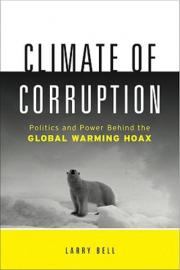 In the past several years, there seems to be a growing number of people who believe that global warming is a very orchestrated political and environmental hoax. As hype around Earth Day is growing (April 22, 2011), I thought it would be interesting to read, “Climate of Corruption: Politics and Power Behind the Global Warming Hoax,” by Larry Bell. Now Larry Bell is no more a climate scientist than Al Gore. He is a space architect and doesn’t pretend to be anything different. But Bell believes there is a conspiracy amongst us relating to the horrors of climate change that center around fossil-fuel CO2 emissions.
In the past several years, there seems to be a growing number of people who believe that global warming is a very orchestrated political and environmental hoax. As hype around Earth Day is growing (April 22, 2011), I thought it would be interesting to read, “Climate of Corruption: Politics and Power Behind the Global Warming Hoax,” by Larry Bell. Now Larry Bell is no more a climate scientist than Al Gore. He is a space architect and doesn’t pretend to be anything different. But Bell believes there is a conspiracy amongst us relating to the horrors of climate change that center around fossil-fuel CO2 emissions.
He writes, “Understand that the real impetus behind the cooked numbers and doomspeak of the global warmers has little to do with the state of the environment and much to do with shackling capitalism and transforming the American way of life in the interests of global wealth redistribution (“social justice”).
Bell acknowledges that climate change is real – only that it is not man-made- and says that no one can reliably predict what Earth’s global climate will be in a decade or longer. What he sees as the real problem is the global energy supply dilemma, one that he believes has no simple solution.
Throughout the book, Bell lays out his case for his way of thinking beginning with “outing” those who are “cooking the climate books.” This includes Al Gore as well as the United Nations’ Intergovernmental Panel on Climate Change (IPCC). In other words, he “sets the record straight.” From there, he highlights those that he believes are political hijackers of science – meaning policy makers who have molded climate science research to support their own agenda – mainly cap and trade. (I fondly call this crap and raid.) Bell argues that all forms of cap and trade are scams.
 Next, he helps us get a real grip on “green energy.” Bell believes that the world’s readily accessible oil and gas deposits are dwindling and the the world must exploit all reasonable alternatives. However, “alternative energy sources” such as wind, solar and corn-based ethanol, are in his view, not reasonable alternatives. Bell argues that as the public has been hoodwinked by climate change and they have also been hoodwinked by the promises of green energy. He writes, “Many are beginning to realize that most green expectations are oversold and color-blind.”
Next, he helps us get a real grip on “green energy.” Bell believes that the world’s readily accessible oil and gas deposits are dwindling and the the world must exploit all reasonable alternatives. However, “alternative energy sources” such as wind, solar and corn-based ethanol, are in his view, not reasonable alternatives. Bell argues that as the public has been hoodwinked by climate change and they have also been hoodwinked by the promises of green energy. He writes, “Many are beginning to realize that most green expectations are oversold and color-blind.”
So what’s the problem with green energy? First, Bell says it is currently uncompetitive, especially when compared to current energy sources. Second, he argues that green energy is actually browner than people realize. Third, they will not present a major supply-side solution to our energy challenges. Rather than support these types of energy sources, Bell supports nuclear power and the creation of technologies that will produce cleaner energy from coal and other fossils.
If you could pull out an overall message in the book, its that the public needs to be better informed; yet, he struggles with who should we trust to give us the truth. Regardless of whether you agree or disagree with Bell, if you learn one thing from the book it’s that you shouldn’t take any information about climate change or energy solutions at face value.

